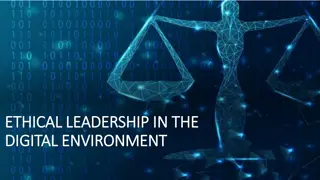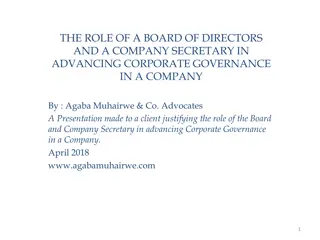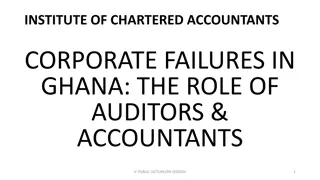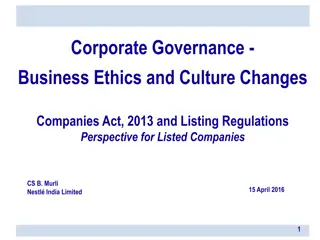Understanding Corporate Governance and Ethics in Business Environment
Corporate governance is crucial for aligning the interests of stakeholders with effective control of the firm. It addresses issues of ownership, control, and information asymmetry, fostering accountability, transparency, and integrity. Ethics, a branch of philosophy, guides moral principles applied in business, focusing on fairness and right conduct. Business ethics involves principles that govern organizational behavior and interactions with stakeholders, balancing profit-making with social responsibility.
Download Presentation

Please find below an Image/Link to download the presentation.
The content on the website is provided AS IS for your information and personal use only. It may not be sold, licensed, or shared on other websites without obtaining consent from the author. Download presentation by click this link. If you encounter any issues during the download, it is possible that the publisher has removed the file from their server.
E N D
Presentation Transcript
Governance and Ethics in the Business Environment: Governance and Ethics in the Business Environment: Business case for shareholders and other stakeholders Business case for shareholders and other stakeholders
Corporate Governance A corporate governance framework is a detailed governance, risk and compliance system which synchronizes governance with risk and compliance. It addresses all the issues within an organization relating to strategy, processes, technology and people. Corporate governance is not a once- off activity but a long term corporate culture. An effective governance policy recognizes a governance framework and an integrated reporting system. It makes us look at things from as many angles as possible
Necessity of Corporate Governance What makes corporate governance necessary? Put simply, the interests of those who have effective control over a firm can differ from the interests of those who supply the firm with external finance. The problem commonly referred to as a principal- agent problem, grows out of the separation of ownership and control and of corporate outsiders and insiders. In the absence of the protections that good governance supplies, asymmetries of information and difficulties of monitoring results in capital providers who lack control over the corporation, finding it risky and costly to protect themselves from the opportunistic behavior of managers and controlling shareholders. (OECD)
Corporate Governance Principles Principles Core Values Accountability Responsibility Honesty and Transparency Integrity Openness Mutual respect Performance Evaluation Commitment Fairness Accountability Responsibility Transparency
What is Ethics? What is Ethics? Ethics is the branch of philosophy that focuses on morality and the way in which moral principles are applied to everyday life; Ethics has to do with fundamental questions such as, What is fair? , What is Just? , and What is the right thing to do in this situation? ; Ethics involves an active process of applying values, which may range from religious principles to customs and traditions.
Business Ethics Business ethics can be defined as the principles, norms and standards that guide an organization's conduct of its activities, internal relations and interactions with external stakeholders Business ethics focuses on what constitutes right and wrong behavior in the world of business; Corporate business executives have a responsibility to their shareholders and employees to make a profit. But in doing so, business people also have a responsibility to the public and themselves to maintain ethical principles. Although ethics provides moral guidelines, individuals must apply these guidelines in making decisions. Business ethics is not a separate theory or ethics; rather it is an application of ethics to business situations. Higher ethical standards are expected of professionals who serve as models in society e.g. Attorneys, business leaders, religious leaders, executives etc
Importance of Ethics to the Organization Importance of Ethics to the Organization Ethics is the cornerstone of corporate governance Ethics ensures the sustainability of a business Good corporate reputation is built on a solid foundation of ethical culture A culture of trust must be built on a corporate framework of ethical principles which are transparency/ openness, competence, integrity and benevolence Ethics play a major role in the prevention of fraud. Fraud prevention becomes a shared responsibility among the members of the organization
Roots of Unethical Behavior Roots of Unethical Behavior Personal ethics Decision-making processes Organization Culture Leadership style Coercion Unrealistic performance expectations Greed Corruption Increase in acute competition Information on unethical acts through the media Pressure to earn profits and bonuses Lack of management support
Characteristics of Ethical Businesses Characteristics of Ethical Businesses Ethical businesses are based on the principle of fairness; All stakeholders are treated equally without any discrimination; Benefit of stakeholders is given precedence over own interest; Thereis clear communication in ethical businesses; What is to be done, how it is to be done is clearly stated; No bureaucracy; and Strict adherence and compliance with applicable laws
Benefits of Ethical Behavior in Business Benefits of Ethical Behavior in Business Business goodwill Prevention of litigation Development of society Strong public image and reputation Support employee growth Strong teamwork and high productivity Build trust among all stakeholders
Ethics and Business untold truth Dog eat Dog Nice guys/girls come second It is impossible to be both ethical and successful in business. Ethics and business Either one is unethical and successful, or unsuccessful. In short, ethics is detrimental to business. Business is a dog eat dog world. The business environment is a lonely and hostile world. Either you trample on others, or you trampled upon. interests of others would be a fatal mistake. It would leave you vulnerable and open to attack from any of the other dogs in implication for ethics is clear. There is no room for ethics in business, because business demands that you should fight for your own interests. yourself To will be the are opposites. consider ethical and the pack. The success in
Why is it much harder to do right rather than wrong? Because it is the right thing to do! There are two dogs inside me. One of the dogs is mean and evil. The other dog is good. The mean dog fights the good dog all the time. . . which dog usually wins . . . the one I feed the most. - words of a Native American Tribal Leader, retold by Harold Kushner
























